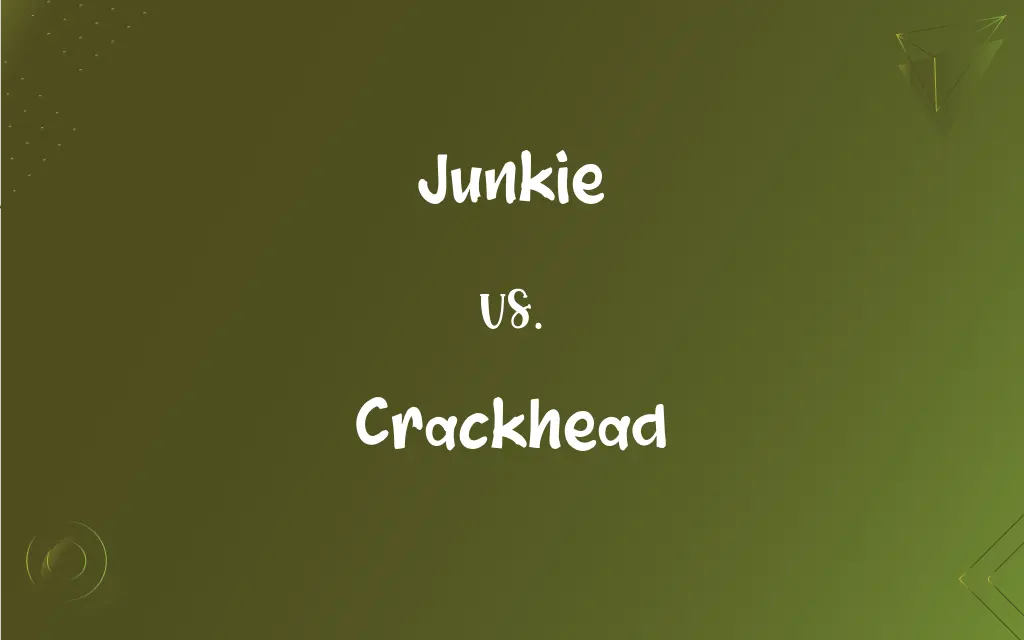Junkie vs. Crackhead: What's the Difference?
Edited by Janet White || By Harlon Moss || Updated on November 2, 2023
A "junkie" is a slang term for a drug addict, while a "crackhead" is specifically addicted to crack cocaine.

Key Differences
The term "junkie" is a broad term that refers to a person with a compulsion for habitual drug use. The term "crackhead" is a derogatory slang term that specifically describes someone addicted to crack cocaine, highlighting not only the substance but often the destructive behavior associated with its use.
"Junkie" originally referred to those addicted to narcotics, especially heroin, from the word "junk," which was slang for heroin. "Crackhead" emerged later, pinpointing individuals who use the freebase form of cocaine known as "crack." The usage of "crackhead" surged in the 1980s during the crack epidemic in the United States.
The term "junkie" can be used to refer to individuals addicted to various drugs, whereas "crackhead" is not used for addicts of drugs other than crack cocaine. "Junkie" has also evolved in casual speech to describe someone with a very strong interest in a non-drug related activity or subject.
Both terms carry a heavy stigma and can be considered offensive. They suggest a problematic relationship with substances that adversely affects an individual's life. In recent times, there has been a move towards using more compassionate language when referring to individuals suffering from addiction.
Comparison Chart
Specificity
General term for drug addicts.
Specifically refers to crack cocaine users.
ADVERTISEMENT
Origin
Comes from "junk," slang for heroin.
Derived from "crack," the form of cocaine.
Usage
Can describe any severe addiction.
Used only for crack cocaine addiction.
Connotation
Broadly negative.
Extremely negative with specific behavioral connotations.
Versatility
Has evolved to describe non-drug obsessions.
Remains specific to drug use.
Junkie and Crackhead Definitions
Junkie
A derogatory term for someone with a dependency on narcotics.
The police regularly checked on the junkie living under the bridge.
ADVERTISEMENT
Crackhead
A person addicted to crack cocaine.
The crackhead was always looking for his next fix.
Junkie
Someone extremely enthusiastic about a hobby or interest.
She's a real junkie for fantasy novels.
Crackhead
Used to describe someone whose life is controlled by crack cocaine addiction.
The crackhead's addiction cost him his job and family.
Junkie
A person with a compulsive habit, particularly drug use.
He was a former junkie who turned his life around.
Crackhead
A stigmatizing label for people with a particular substance abuse problem.
The neighborhood knew the man as a crackhead, but he was struggling with much more.
Junkie
Colloquially, an individual with an intense craving for something.
I'm a coffee junkie in the mornings.
Crackhead
A derogatory term for an individual displaying the desperate behaviors associated with crack addiction.
The crackhead stole from his own family to feed his habit.
Junkie
A term used to describe a person who cannot stop using drugs.
The neighborhood junkie often panhandled for money.
Crackhead
Slang for someone who behaves erratically, often due to crack use.
You could tell he was a crackhead by his jittery movements.
Junkie
A narcotics addict, especially one using heroin.
Crackhead
A heavy user of crack cocaine.
Crackhead
A person who is addicted to or regularly uses crack cocaine.
Crackhead
Someone whose thinking makes no sense; a fool or an idiot.
What kind of crackhead came up with that?
FAQs
What does "junkie" imply?
It implies a severe addiction, especially to drugs.
Is "crackhead" a medical term?
No, it's slang and not used professionally.
Are these terms considered offensive?
Yes, both terms are stigmatizing and offensive.
Can "junkie" refer to non-drug addictions?
Yes, it's also used colloquially for non-drug obsessions.
Is there a push to change how we refer to drug addicts?
Yes, there's a push towards more compassionate language.
Is it appropriate to use "junkie" to describe someone who loves video games?
Colloquially, yes, but it trivializes addiction.
Can calling someone a "crackhead" impact their recovery?
Yes, stigmatizing language can hinder recovery efforts.
Does "junkie" always indicate an active addiction?
Not necessarily, it can also refer to past addiction.
Do these terms imply a lack of willpower?
They can, but addiction is a complex medical condition.
Is using "junkie" or "crackhead" harmful?
Yes, they perpetuate stigma and misconceptions about addiction.
Is "crackhead" ever used in a non-drug context?
Rarely, it's almost exclusively used to describe crack cocaine addicts.
Do these terms reflect societal views on addiction?
Yes, they reflect negative stereotypes and stigma.
Can someone be a "crackhead" for using crack once?
The term typically implies chronic use and addiction.
Should media outlets use the term "junkie"?
Use of such stigmatizing language is generally discouraged.
Are these terms legally defamatory?
They could be, depending on context and intent.
Are "junkie" and "crackhead" medical diagnoses?
No, they are not clinical terms.
Has the use of "junkie" in popular culture changed?
Yes, it's sometimes used lightly to describe intense enthusiasm.
Is "junkie" specific to any drug?
Historically heroin, but now it's used more broadly.
What's the preferred language for someone with addiction?
"Person with a substance use disorder" is preferred.
Is it ever okay to use "junkie" or "crackhead"?
It's best to avoid these terms due to their derogatory nature.
About Author
Written by
Harlon MossHarlon is a seasoned quality moderator and accomplished content writer for Difference Wiki. An alumnus of the prestigious University of California, he earned his degree in Computer Science. Leveraging his academic background, Harlon brings a meticulous and informed perspective to his work, ensuring content accuracy and excellence.
Edited by
Janet WhiteJanet White has been an esteemed writer and blogger for Difference Wiki. Holding a Master's degree in Science and Medical Journalism from the prestigious Boston University, she has consistently demonstrated her expertise and passion for her field. When she's not immersed in her work, Janet relishes her time exercising, delving into a good book, and cherishing moments with friends and family.































































